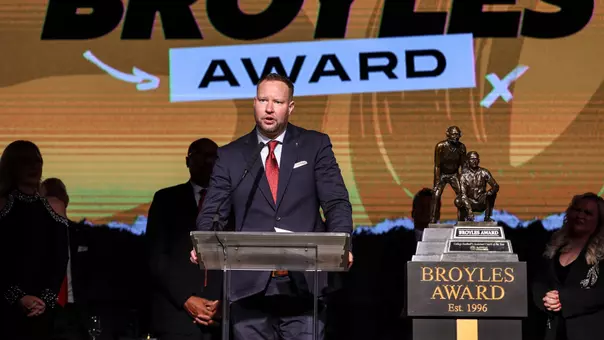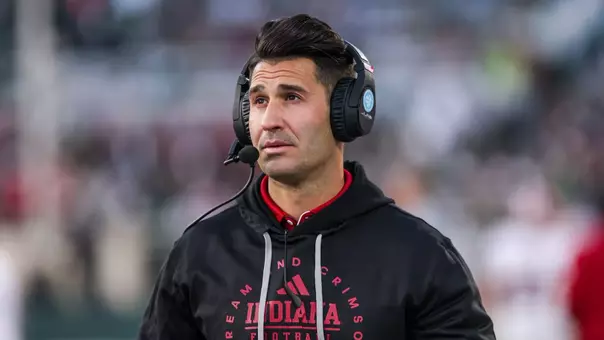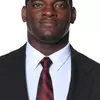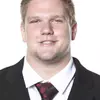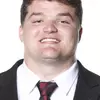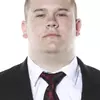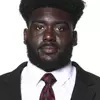Indiana University Athletics
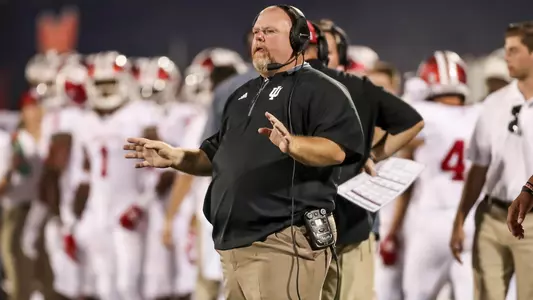
Let’s Pretend – Developing Good Offensive Line Play Requires Creativity
4/28/2020 9:15:00 AM | Football
By Pete DiPrimio
IUHoosiers.com
BLOOMINGTON, Ind. – Are acting lessons next in Indiana's football quest to build a better offensive line?
You be the judge.
In these pandemic times, where stay away from everybody is the new training norm, offensive line coach Darren Hiller seeks maximum player development.
That means creativity. It means, in fact, having offensive linemen tap into their inner Peyton Manning.
Yes, Peyton Manning, the former NFL quarterback superstar.
"I'm telling them to pretend that they're Peyton Manning calling an audible at the line of scrimmage," Hiller says.
No, that doesn't mean yelling "Omaha!" and throwing passes. Well, maybe it does, but that misses the point, which is Hiller wants his players finding advantages in apparent disadvantage.
Great offensive line play demands five guys playing as one. It requires building chemistry and communication so everyone knows what needs to be done against defenses designed to confuse.
That's hard to do with via long-distance solo workouts.
Hard, but not impossible.
"That's the biggest issue with our guys," Hiller says. "They're telling me that they're doing things, but having a guy next to you and the communication from the time a play is called and the togetherness of the unit, it's not there right now."
Hiller says his first thought was to have players get others to work with them, but because of social distancing, "We don't want guys doing that."
The next option -- imagination.
"I'm telling them to get in their stance and imagine a play is called and make a communication to the guy next to you. Play a game by yourself."
And then, he acknowledges, "It's hard."
Hiller says offensive linemen represent 45.5 percent of the offensive players on every play (five linemen make up the 11-player total), but their impact is bigger than that.
"You've all heard us say big men lead the way. I always compare the offensive line to the engine of a car. You can have a nice paint job, rims and tires, but if you don't have a good motor, that car is not going to get from point A to point B."
Hiller, entering his fourth season at IU, and 27th overall, might be coming off the best coaching year of his career. Injuries sidelined standout veteran Coy Cronk for most of the season, and others for parts of it, forcing Hiller to ramp up the development mode (see the way true freshman Matthew Bedford stepped up in Cronk's absence).
Still, the line performed well enough to help the offense score at least 30 points in nine games last season and finish second in the Big Ten in passing. IU went 8-5, its first winning record since 2007.
With Cronk gone along with fellow starters Hunter Littlejohn and Simon Stepaniak, Hiller has more development to do. Losing most of spring practice and then not being able to utilize IU facilities, adds to his challenge, and that of his players.
"It's hard for these guys," he says. "They're itching to get back, but I told them, we are where we are and everybody's in the same situation. We've all been dealt the same hand. We have to be smart, continue to work and be as prepared as possible for when we do get the opportunity to come back."
That means pushing when temptation to relax surfaces. Hiller stresses that in every virtual position meeting.
"I tell them, when you wake up and look in the mirror, are you to a man doing the best you can from a preparation standpoint?
"When we do get back, are we going to be able to hit the ground running, or are we going to have to play catch up and get you functional from a conditioning and skill set standpoint? That's the challenge."
A top priority is center, which is basically the quarterback of the offensive line. Littlejohn had that job last season. Hiller calls the center, "The Sheriff."
"What he says goes. As long as we're operating off what he says, then we're going to have a chance to be successful on a play. If nobody knows what the sheriff is telling them to do, then we're going to have problems."
This season's center burden will likely fall on veteran Harry Crider, last year's starting left guard.
It's nothing new to Crider. He played eight games at center as a freshman in 2017, and filled in for Littlejohn against Maryland last season.
"Moving him back," Hiller says, "he felt comfortable. He really liked the idea of moving inside.
"He likes having the ball in his hands. He's very smart. He knows what we're doing. He knows the calls."
A full spring would have really helped him, Hiller adds.
"I wish that he could have had all of the practices, but he's done that before and there's really been no issues with the virtual practices.
"The biggest thing about Harry is the vocal part. He knows what to say, he just needs to get a little (deeper) in his voice at times and take control. He's knows what to do in communication, he's just got to be a little bit louder, more vocal, but he's awesome."
Crider's versatility reflects Hiller's approach to overcoming injuries that so often hit the offensive line.
"I always talk about position flexibility."
Hiller has plenty of it with Dylan Powell (a graduate transfer from Stanford whom Hiller calls, "very sharp") as well as returning players Charlie O'Connor, Mackenzie Nworah and Mike Katic.
"There's a lot of position flexibility in the interior," Hiller says. "We have to get back here to work so we know what the best way to go about it is."
Leadership is another priority. As the most experienced player, Crider is the obvious choice, "but Harry's a quiet guy," Hiller says.
Other options include fellow returning starters Caleb Jones and Bedford, plus Nworah, who will be a fifth-year senior.
"Caleb has a great personality and will talk," Hiller says. "Nworah is a quiet guy, a lot like Harry. Bedford is a great personality guy.
"We know who the leaders are from a work prospective. Now it's who is going to be that vocal guy. There are some questions in that regard."
IUHoosiers.com
BLOOMINGTON, Ind. – Are acting lessons next in Indiana's football quest to build a better offensive line?
You be the judge.
In these pandemic times, where stay away from everybody is the new training norm, offensive line coach Darren Hiller seeks maximum player development.
That means creativity. It means, in fact, having offensive linemen tap into their inner Peyton Manning.
Yes, Peyton Manning, the former NFL quarterback superstar.
"I'm telling them to pretend that they're Peyton Manning calling an audible at the line of scrimmage," Hiller says.
No, that doesn't mean yelling "Omaha!" and throwing passes. Well, maybe it does, but that misses the point, which is Hiller wants his players finding advantages in apparent disadvantage.
Great offensive line play demands five guys playing as one. It requires building chemistry and communication so everyone knows what needs to be done against defenses designed to confuse.
That's hard to do with via long-distance solo workouts.
Hard, but not impossible.
"That's the biggest issue with our guys," Hiller says. "They're telling me that they're doing things, but having a guy next to you and the communication from the time a play is called and the togetherness of the unit, it's not there right now."
Hiller says his first thought was to have players get others to work with them, but because of social distancing, "We don't want guys doing that."
The next option -- imagination.
"I'm telling them to get in their stance and imagine a play is called and make a communication to the guy next to you. Play a game by yourself."
And then, he acknowledges, "It's hard."
Hiller says offensive linemen represent 45.5 percent of the offensive players on every play (five linemen make up the 11-player total), but their impact is bigger than that.
"You've all heard us say big men lead the way. I always compare the offensive line to the engine of a car. You can have a nice paint job, rims and tires, but if you don't have a good motor, that car is not going to get from point A to point B."
Hiller, entering his fourth season at IU, and 27th overall, might be coming off the best coaching year of his career. Injuries sidelined standout veteran Coy Cronk for most of the season, and others for parts of it, forcing Hiller to ramp up the development mode (see the way true freshman Matthew Bedford stepped up in Cronk's absence).
Still, the line performed well enough to help the offense score at least 30 points in nine games last season and finish second in the Big Ten in passing. IU went 8-5, its first winning record since 2007.
With Cronk gone along with fellow starters Hunter Littlejohn and Simon Stepaniak, Hiller has more development to do. Losing most of spring practice and then not being able to utilize IU facilities, adds to his challenge, and that of his players.
"It's hard for these guys," he says. "They're itching to get back, but I told them, we are where we are and everybody's in the same situation. We've all been dealt the same hand. We have to be smart, continue to work and be as prepared as possible for when we do get the opportunity to come back."
That means pushing when temptation to relax surfaces. Hiller stresses that in every virtual position meeting.
"I tell them, when you wake up and look in the mirror, are you to a man doing the best you can from a preparation standpoint?
"When we do get back, are we going to be able to hit the ground running, or are we going to have to play catch up and get you functional from a conditioning and skill set standpoint? That's the challenge."
A top priority is center, which is basically the quarterback of the offensive line. Littlejohn had that job last season. Hiller calls the center, "The Sheriff."
"What he says goes. As long as we're operating off what he says, then we're going to have a chance to be successful on a play. If nobody knows what the sheriff is telling them to do, then we're going to have problems."
This season's center burden will likely fall on veteran Harry Crider, last year's starting left guard.
It's nothing new to Crider. He played eight games at center as a freshman in 2017, and filled in for Littlejohn against Maryland last season.
"Moving him back," Hiller says, "he felt comfortable. He really liked the idea of moving inside.
"He likes having the ball in his hands. He's very smart. He knows what we're doing. He knows the calls."
A full spring would have really helped him, Hiller adds.
"I wish that he could have had all of the practices, but he's done that before and there's really been no issues with the virtual practices.
"The biggest thing about Harry is the vocal part. He knows what to say, he just needs to get a little (deeper) in his voice at times and take control. He's knows what to do in communication, he's just got to be a little bit louder, more vocal, but he's awesome."
Crider's versatility reflects Hiller's approach to overcoming injuries that so often hit the offensive line.
"I always talk about position flexibility."
Hiller has plenty of it with Dylan Powell (a graduate transfer from Stanford whom Hiller calls, "very sharp") as well as returning players Charlie O'Connor, Mackenzie Nworah and Mike Katic.
"There's a lot of position flexibility in the interior," Hiller says. "We have to get back here to work so we know what the best way to go about it is."
Leadership is another priority. As the most experienced player, Crider is the obvious choice, "but Harry's a quiet guy," Hiller says.
Other options include fellow returning starters Caleb Jones and Bedford, plus Nworah, who will be a fifth-year senior.
"Caleb has a great personality and will talk," Hiller says. "Nworah is a quiet guy, a lot like Harry. Bedford is a great personality guy.
"We know who the leaders are from a work prospective. Now it's who is going to be that vocal guy. There are some questions in that regard."
Players Mentioned
FB: Curt Cignetti Media Availability (1/17/26)
Saturday, January 17
FB: Curt Cignetti Media Availability (1/16/26)
Friday, January 16
FB: CFP National Championship Game - Student-Athlete Press Conference
Tuesday, January 13
FB: Curt Cignetti Media Availability (1/12/26)
Monday, January 12


